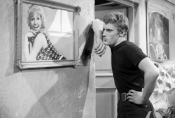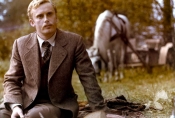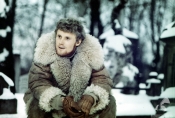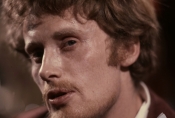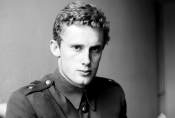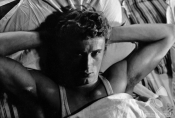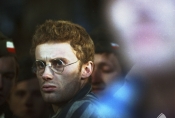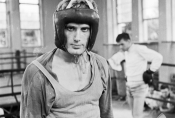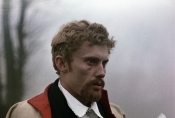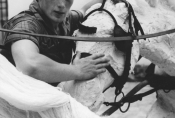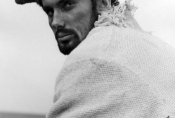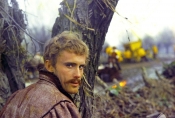Daniel Olbrychski
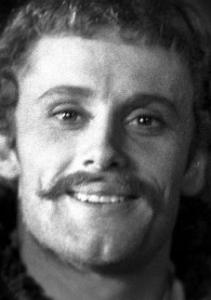
He was born on February 27, 1945 in Łowicz. In 1971, he past his extramural acting exam at the State Theatre Academy in Warsaw. An Actor in several Warsaw theatres, including Powszechny and Narodowy. Winner of many prestigious awards, including the Zbigniew Cybulski Award (1969, 1975), the Silver Mask (1970), the Golden Mask (1971), Superwiktor 2001 (2002), as well as awards for lifetime achievement at festivals in Trenčianskie Teplice (1999), Moscow (2007) and Tarnow (2012).
He first appeared on screen at the age of 18, in the leading role of a guerrilla soldier, Corporal Koral in Janusz Nasfeter’s film Ranny w lesie/ The Wounded Man in the Forest (1963). Two years later he was “promoted” to the rank of second lieutenant in Potem nastąpi cisza/Silence Shall Follow (1965) by Janusz Morgenstern, devoted to the political conflict of 1944. At the same time, he portrayed Rafał Olbromski in the spectacular, albeit controversial film adaptation of Stefan Żeromski's Popioły/Ashes (1965), directed by Andrzej Wajda. Europe in the Napoleonic era. The protagonists, young Polish nobles, maturing through tragic experiences, come to realise the illusive nature of their hopes for independence. This remarkable, youthful performance marked the beginning of Olbrychski’s collaboration with Wajda, which yielded numerous extremely interesting and diverse roles. In 1968, the director made a film titled Wszystko na sprzedaż/Everything for Sale, in which he portrayed his own friends, mixing fiction and fact in the screenplay. Andrzej Wajda is known for his adaptations of literary works. This time, he wrote the script himself. The film was inspired by the tragic death of Zbigniew Cybulski. Olbrychski plays himself – a young actor who has to “take over” from his departed colleague. A year earlier, they had both appeared in Jowita (1967) by Janusz Morgenstern, a successful film adaptation of Stanisław Dygat’s Disneyland. Olbrychski starred as a young athlete, unable to imagine his own future, dissatisfied with sport, and incapable of responding to the love he yearns. Cybulski portrayed his coach – it was the actor’s last performance.
Olbrychski appeared in other films by Wajda, including: Polowanie na muchy/Hunting Flies (1969), in which he played a man abandoned by his heroine, Krajobraz po bitwie/Landscape After Battle (1970) inspired by the prose of Tadeusz Borowski, devoted to a generation haunted by the memories of the war and unable to find a place for themselves in the new reality, and Brzezina/The Birch Wood (1970), a gripping tale of love, life, and death based on a short story by Jarosław Iwaszkiewicz. Nine years later, he starred as Wiktor Ruben in Wajda’s adaptation of Panny z Wilka/The Maids of Wilko (1979). In an attempt to revisit past experiences, a forty-year-old man goes back to the place where he spent his youth surrounded by girls, some of whom were more than friends. Another moving story about life, love, death and the passing of time.
In 1972, Wajda adapted – with great success – Wesele/The Wedding by Wyspiański, casting Olbrychski as the Groom. Two years later, he cast him in the role of Karol Borowiecki in another film adaptation of a literary classic, Ziemia obiecana/The Promised Land (1974), a spectacular take on the novel by Władysław Reymont. It is the story of three friends who set out to earn their fortunes in nineteenth century Łódź. “There are three heroes, one of whom is Polish (Daniel Olbrychski), another – German (Andrzej Seweryn), and the third – a Jew (Wojciech Pszoniak). Yet they do not let these differences come between them. Together, they set up a factory. They share a common interest, a shared sense of class identity,” says Wajda. After the premiere, the trio of actors were dubbed the “Three Musketeers of Polish cinema.”
At the turn of the century Olbrychski appeared in two other adaptations of classic Polish literary texts directed by Wajda: Pan Tadeusz (1999) as Gerwazy and Zemsta/Revenge (2002) as Dyndalski, the servant of Cześnik.
Another director who appreciated Olbrychski’s acting talent has been Jerzy Hoffman, who cast him in numerous roles in his costume dramas, such as: Azja Tugai Bey in Pan Wołodyjowski/Fire in the Steppe (1969) and Ogniem i mieczem/With Fire and Sword (1999), Andrzej Kmicic in Potop/The Deluge (1974), Piastun in Stara baśń/Old Tale (2003), and Józef Pilsudski in 1920. Bitwa warszawska/1920. The Battle of Warsaw (2011).
Olbrychski has shown a preference for roles in costume films, such as Charles XII, King of Sweden, in Hrabina Cosel/Countess Cosel (1967) by Jerzy Antczak, Lieutenant Stefan Sowiński in Sól ziemi czarnej/Salt of the Black Earth (1969) by Kazimierz Kutz, Fr. Paczkowski in Wizja lokalna/Observation on the Spot 1901 (1980) by Filip Bajon, the title the hero in Rycerz/The Knight (1980) by Lech Majewski, or Szymon Gajowiec in Bajon’s Przedwiośnie/The Spring To Come (2001). Olbrychski has also been in a number of contemporary films, such as Tolek Szczepaniak in Bokser/The Boxer (1966) by Julian Dziedzina, Wituś in Życie rodzinne/Family Life (1970) by Krzysztof Zanussi, Zygmunt in Kung-fu (1979) by Janusz Kijowski, Michał Kątny in Witold Leszczynski’s Siekierezada/The Axiliad (1985), inspired by the work of Edward Stachura, and Rafał Nawrot in Kolejność uczuć/The Sequence of Feelings (1993) by Radosław Piwowarski.
Olbrychski is not only an excellent actor but also a versatile one. In 2010, he received a Special Golden Duck Award for “Best Actor in the Best Films.
Selected filmography
-
1969
THE SALT OF THE BLACK EARTH
reż. Kazimierz Kutz
-
1970
THE BIRCH WOOD
reż. Andrzej Wajda
-
1972
THE WEDDING
reż. Andrzej Wajda
-
1974
THE DELUGE
reż. Jerzy Hoffman
-
1974
THE PROMISED LAND
reż. Andrzej Wajda
-
1979
THE MAIDS OF WILKO
reż. Andrzej Wajda
-
1985
AXILIAD
reż. Witold Leszczyński
-
1993
THE SEQUENCE OF FEELINGS
reż. Radosław Piwowarski
